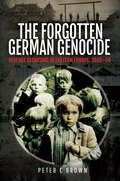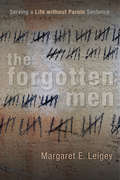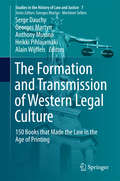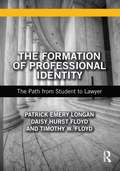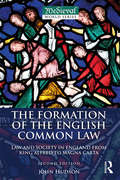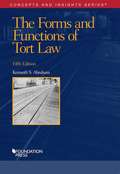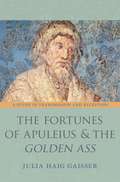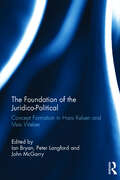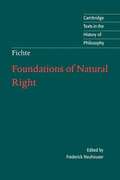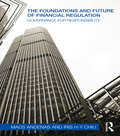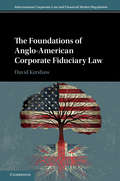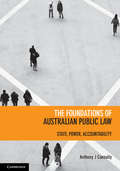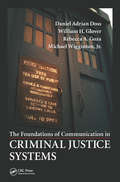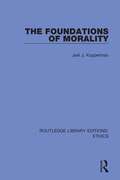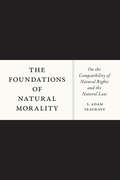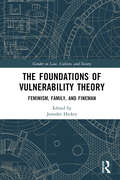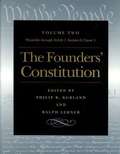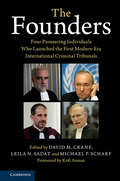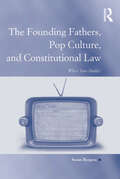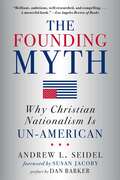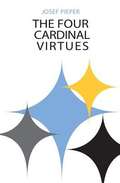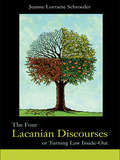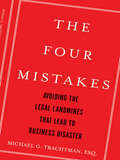- Table View
- List View
The Forgotten German Genocide: Revenge Cleansing in Eastern Europe, 1945–50
by Peter C. BrownThe Potsdam Conference (officially known as the "Berlin Conference"), was held from 17 July to 2 August 1945 at Cecilienhof Palace, the home of Crown Prince Wilhelm, in Brandenburg, and saw the leaders of the United Kingdom, the Soviet Union and the United States, gathered together to decide how to demilitarize, denazify, decentralize, and administer Germany, which had agreed to unconditional surrender on 8 May (VE Day). They determined that the remaining German populations in Poland, Czechoslovakia and Hungary - both the ethnic (Sudeten) and the more recent arrivals (as part of the long-term plan for the domination of Eastern Europe) - should to be transferred to Germany, but despite an undertaking that these would be effected in an orderly and humane manner, the expulsions were carried out in a ruthless and often brutal manner. Land was seized with farms and houses expropriated; the occupants placed into camps prior to mass expulsion from the country. Many of these were labor camps already occupied by Jews who had survived the concentration camps, where they were equally unwelcome. Further cleansing was carried out in Romania and Yugoslavia, and by 1950, an estimated 11.5 million German people had been removed from Eastern Europe with up to three million dead. The number of ethnic Germans killed during the ‘cleansing’ period is suggested at 500,000, but in 1958, Statistisches Bundesamt (the Federal Statistical Office of Germany) published a report which gave the figure of 1.6 million relating to expulsion-related population losses in Poland alone. Further investigation may in due course provide a more accurate figure to avoid the accusation of sensationalism.
The Forgotten Men
by Margaret E. LeigeyToday there are approximately fifty thousand prisoners in American prisons serving life without parole, having been found guilty of crimes ranging from murder and rape to burglary, carjacking, and drug offences. In The Forgotten Men, criminologist Margaret E. Leigey provides an insightful account of a group of aging inmates imprisoned for at least twenty years, with virtually no chance of release. These men make up one of the most marginalized segments of the contemporary U.S. prison population. Considered too dangerous for rehabilitation, ignored by prison administrators, and overlooked by courts disinclined to review such sentences, these prisoners grow increasingly cut off from family and the outside world. Drawing on in-depth interviews with twenty-five such prisoners, Leigey gives voice to these extremely marginalized inmates and offers a look at how they struggle to cope. She reveals, for instance, that the men believe that permanent incarceration is as inhumane as capital punishment, calling life without parole "the hard death penalty." Indeed, after serving two decades in prison, some wished that they had received the death penalty instead. Leigey also recounts the ways in which the prisoners attempt to construct meaningful lives inside the bleak environment where they will almost certainly live out their lives. Every state in the union (except Alaska) has the life-without-parole sentencing option, despite its controversial nature and its staggering cost to the taxpayer. The Forgotten Men provides a much-needed analysis of the policies behind life-without-parole sentencing, arguing that such sentences are overused and lead to serious financial and ethical dilemmas.
The Formation and Transmission of Western Legal Culture
by Anthony Musson Serge Dauchy Georges Martyn Heikki Pihlajamäki Alain WijffelsThis volume surveys 150 law books of fundamental importance in the history of Western legal literature and culture. The entries are organized in three sections: the first dealing with the transitional period of fifteenth-century editions of medieval authorities, the second spanning the early modern period from the sixteenth to the eighteenth century, and the third focusing on the nineteenth and twentieth centuries. The contributors are scholars from all over the world. Each 'old book' is analyzed by a recognized specialist in the specific field of interest. Individual entries give a short biography of the author and discuss the significance of the works in the time and setting of their publication, and in their broader influence on the development of law worldwide. Introductory essays explore the development of Western legal traditions, especially the influence of the English common law, and of Roman and canon law on legal writers, and the borrowings and interaction between them. The book goes beyond the study of institutions and traditions of individual countries to chart a broader perspective on the transmission of legal concepts across legal, political, and geographical boundaries. Examining the branches of this genealogical tree of books makes clear their pervasive influence on modern legal systems, including attempts at rationalizing custom or creating new hybrid systems by transplanting Western legal concepts into other jurisdictions.
The Formation of Professional Identity: The Path from Student to Lawyer
by Patrick Emery Longan Daisy Hurst Floyd Timothy W. FloydBecoming a lawyer is about much more than acquiring knowledge and technique. As law students learn the law and acquire some basic skills, they are also inevitably forming a deep sense of themselves in their new roles as lawyers. That sense of self – the student’s nascent professional identity – needs to take a particular form if the students are to fulfil the public purposes of lawyers and find deep meaning and satisfaction in their work. In this book, Professors Patrick Longan, Daisy Floyd, and Timothy Floyd combine what they have learned in many years of teaching and research concerning the lawyer’s professional identity with lessons derived from legal ethics, moral psychology, and moral philosophy. They describe in depth the six virtues that every lawyer needs as part of his or her professional identity, and they explore both the obstacles to acquiring and deploying those virtues and strategies for overcoming those impediments. The result is a straightforward guide for law students on how to cultivate a professional identity that will allow them to make a meaningful difference in the lives of others and to flourish as individuals.
The Formation of the English Common Law: Law and Society in England from King Alfred to Magna Carta (The Medieval World)
by John HudsonThe Formation of English Common Law provides a comprehensive overview of the development of early English law, one of the classic subjects of medieval history. This much expanded second edition spans the centuries from King Alfred to Magna Carta, abandoning the traditional but restrictive break at the Norman Conquest. Within a strong interpretative framework, it also integrates legal developments with wider changes in the thought, society, and politics of the time. Rather than simply tracing elements of the common law back to their Anglo-Saxon, Norman or other origins, John Hudson examines and analyses the emergence of the common law from the interaction of various elements that developed over time, such as the powerful royal government inherited from Anglo-Saxon England and land holding customs arising from the Norman Conquest. Containing a new chapter charting the Anglo-Saxon period, as well as a fully revised Further Reading section, this new edition is an authoritative yet highly accessible introduction to the formation of the English common law and is ideal for students of history and law.
The Forms and Functions of Tort Law (Concepts and Insights Series)
by Kenneth AbrahamThe perfect accompaniment to any torts casebook, this text covers all the major cases and issues in a standard torts course. The text addresses cases and analyzes their implications, presenting the law of torts within a curricular context and covering the materials that law students are likely to encounter in a variety of courses. This straightforward, readable text addresses both rules and policy, and presents topics in a way that helps students effectively grapple with issues. Since each chapter stands on its own, the book is ideal as a classroom text, as well as for self-directed reading by students.
The Forms and Functions of Tort Law (second edition)
by Kenneth S. AbrahamThis book is designed to provide a concise analysis of the conceptual foundations of tort liability.
The Fortunes of Apuleius and the Golden Ass: A Study in Transmission and Reception (Martin Classical Lectures #32)
by Julia Haig GaisserThis book traces the transmission and reception of one of the most influential novels in Western literature. The Golden Ass, the only ancient Roman novel to survive in its entirety, tells of a young man changed into an ass by magic and his bawdy adventures and narrow escapes before the goddess Isis changes him back again. Its centerpiece is the famous story of Cupid and Psyche. Julia Gaisser follows Apuleius' racy tale from antiquity through the sixteenth century, tracing its journey from roll to codex in fourth-century Rome, into the medieval library of Monte Cassino, into the hands of Italian humanists, into print, and, finally, over the Alps and into translation in Spanish, French, German, and English. She demonstrates that the novel's reception was linked with Apuleius' reputation as a philosopher and the persona he projected in his works. She relates Apuleius and the Golden Ass to a diverse cast of important literary and historical figures--including Augustine, Fulgentius, Petrarch, Boccaccio, Bessarion, Boiardo, and Beroaldo. Paying equal attention to the novel's transmission (how it survived) and its reception (how it was interpreted), she places the work in its many different historical contexts, examining its representation in art, literary imitation, allegory, scholarly commentary, and translation. The volume contains several appendixes, including an annotated list of the manuscripts of the Golden Ass. This book is based on the author's Martin Classical Lectures at Oberlin College in 2000.
The Foundation and Construction of Ethics
by Franz BrentanoChosen and edited by Franziska Mayer-Hillebrand, translated by Elizabeth Hughes Schneewind, this collection of essays reflects Brentano's lectures at the University of Vienna from 1876 to 1894.
The Foundation of the Juridico-Political: Concept Formation in Hans Kelsen and Max Weber
by Peter Langford Ian Bryan John McGarryHans Kelsen and Max Weber are conventionally understood as initiators not only of two distinct and opposing processes of concept formation, but also of two discrete and contrasting theoretical frameworks for the study of law. The Foundation of the Juridical-Political: Concept Formation in Hans Kelsen and Max Weber places the conventional understanding of the theoretical relationship between the work of Kelsen and Weber into question. Focusing on the theoretical foundations of Kelsen’s legal positivism and Weber’s sociology of law, and guided by the conceptual frame of the juridico-political, the contributors to this interdisciplinary volume explore convergences and divergences in the approach and stance of Kelsen and Weber to law, the State, political science, modernity, legal rationality, legal theory, sociology of law, authority, legitimacy and legality. The chapters comprising The Foundation of the Juridical-Political uncover complexities within as well as between the theoretical and methodological principles of Kelsen and Weber and, thereby, challenge the enduring division between legal positivism and the sociology of law in contemporary discourse.
The Foundations Of Natural Right, according to the Principles of the Wissenschaftslehre
by Michael Baur Frederick Neuhouser J. G. FichteIn the history of philosophy, Fichte's thought marks a crucial transitional stage between Kant and post-Kantian philosophy. Fichte radicalized Kant's thought by arguing that human freedom, not external reality, must be the starting point of all systematic philosophy, and in Foundations of Natural Right, thought by many to be his most important work of political philosophy, he applies his ideas to fundamental issues in political and legal philosophy, covering such topics as civic freedom, rights, private property, contracts, family relations, and the foundations of modern political organization. This volume offers a complete translation of the work into English, by Michael Baur, together with an introduction by Frederick Neuhouser that sets it in its philosophical and historical context.
The Foundations and Future of Financial Regulation: Governance for Responsibility
by Mads Andenas Iris H-Y ChiuFinancial regulation has entered into a new era, as many foundational economic theories and policies supporting the existing infrastructure have been and are being questioned following the financial crisis. Goodhart et al’s seminal monograph "Financial Regulation: Why, How and Where Now?" (Routledge:1998) took stock of the extent of financial innovation and the maturity of the financial services industry at that time, and mapped out a new regulatory roadmap. This book offers a timely exploration of the "Why, How and Where Now" of financial regulation in the aftermath of the crisis in order to map out the future trajectory of financial regulation in an age where financial stability is being emphasised as a key regulatory objective. The book is split into four sections: the objectives and regulatory landscape of financial regulation; the regulatory regime for investor protection; the regulatory regime for financial institutional safety and soundness; and macro-prudential regulation. The discussion ranges from theoretical and policy perspectives to comprehensive and critical consideration of financial regulation in the specifics. The focus of the book is on the substantive regulation of the UK and the EU, as critical examination is made of the unravelling and the future of financial regulation with comparative insights offered where relevant especially from the US. Running throughout the book is consideration of the relationship between financial regulation, financial stability and the responsibility of various actors in governance. This book offers an important contribution to continuing reflections on the role of financial regulation, market discipline and corporate responsibility in the financial sector, and upon the roles of regulatory authorities, markets and firms in ensuring the financial health and security of all in the future.
The Foundations of Anglo-American Corporate Fiduciary Law (International Corporate Law and Financial Market Regulation)
by David KershawThis book explores the foundations and evolution of modern corporate fiduciary law in the United States and the United Kingdom. Today US and UK fiduciary law provide very different approaches to the regulation of directorial behaviour. However, as the book shows, the law in both jurisdictions borrowed from the same sources in eighteenth- and nineteenth-century English fiduciary and commercial law. The book identifies the shared legal foundations and authorities and explores the drivers of corporate fiduciary law's contemporary divergence. In so doing it challenges the prevailing accounts of corporate legal change and stability in the US and the UK.
The Foundations of Australian Public Law: State, Power, Accountability
by Connolly Anthony JIn The Foundations of Australian Public Law, Anthony J. Connolly brings together the two traditionally discrete areas of constitutional and administrative law to present Australian public law as a single, integrated body. Exploring the themes of state, power and accountability in Australia, the text also makes reference to the law of international jurisdictions, where students are informed by contemporary public law theory. Particular attention is also given to the rise of global public law and the increasingly cosmopolitan nature of the subject in Australia. A comprehensive companion website complements the theory and discussion throughout the text and includes chapter summaries, further readings and discussion questions to encourage extended student learning. Written by a leader in the field, The Foundations of Australian Public Law is a key text for students looking to gain a comprehensive understanding of public law across Australia's federal, state and territory jurisdictions.
The Foundations of Communication in Criminal Justice Systems
by Daniel Adrian Doss Michael Wigginton Jr. William H. Glover Jr. Rebecca A. GozaMyriad forms of communication occur within the criminal justice system as judges and attorneys speak to juries, law enforcement officers interact with the public, and the news media presents stories of events in courtrooms. Hindrances abound, however. Law enforcement officers and justice system personnel often encounter challenges that affect their
The Foundations of Morality
by Joel J. KuppermanOriginally published in 1983, this book maintains that the content and character of morality can be understood if it is regarded as a useful societal tool, whose central purposes include the prevention of harm and promotion of security for members of society. At the foundation is the general superiority of policies and attitudes that have good consequences. The book argues that ethics is ‘cognitive’ and explores the kinds of ethical knowledge and the ways in which ethical claims can be challenged and justified.
The Foundations of Natural Morality: On the Compatibility of Natural Rights and the Natural Law
by S. Adam SeagraveRecent years have seen a renaissance of interest in the relationship between natural law and natural rights. During this time, the concept of natural rights has served as a conceptual lightning rod, either strengthening or severing the bond between traditional natural law and contemporary human rights. Does the concept of natural rights have the natural law as its foundation or are the two ideas, as Leo Strauss argued, profoundly incompatible?With "The Foundations of Natural Morality, " S. Adam Seagrave addresses this controversy, offering an entirely new account of natural morality that compellingly unites the concepts of natural law and natural rights. Seagrave agrees with Strauss that the idea of natural rights is distinctly modern and does not derive from traditional natural law. Despite their historical distinctness, however, he argues that the two ideas are profoundly compatible and that the thought of John Locke and Thomas Aquinas provides the key to reconciling the two sides of this long-standing debate. In doing so, he lays out a coherent concept of natural morality that brings together thinkers from Plato and Aristotle to Hobbes and Locke, revealing the insights contained within these disparate accounts as well as their incompleteness when considered in isolation. Finally, he turns to an examination of contemporary issues, including health care, same-sex marriage, and the death penalty, showing how this new account of morality can open up a more fruitful debate.
The Foundations of Vulnerability Theory: Feminism, Family, and Fineman (Gender in Law, Culture, and Society)
by Jennifer HickeyThis volume is the first collection of Martha Albertson Fineman’s most important and influential work. Feminist legal theorist Martha Albertson Fineman has spent decades pushing the boundaries of law, questioning and reconceptualizing legal and social definitions of family, dependency, vulnerability, and state responsibility. The pieces collected in this book trace the arc of Fineman’s scholarship, from gender equality; to the role of the family as a social institution; to dependency; to autonomy; to the legal subject and vulnerability theory. This book reflects a lifetime of radical reimagining of the relationship between the state, individuals, families, and other social institutions that is just as relevant today, if not more so. In this book, Fineman offers a foundation for the achievement of true social justice, through the centering of our shared human vulnerability and dependency, grounded in the recognition of the ontological body and its material needs. Arranged in sections, and introduced by leading scholars in the field, these pieces ask us to re-examine our legally enshrined commitment to formal equality and the “mythological” autonomous independent legal subject; recognizing instead that we must call for an active and responsive state that meaningfully provides resilience through its social institutions. This collection demonstrates an evolution of heretical thought that has always pressed for a deeper understanding of the foundations of law and society, offering a model for other scholars on how to keep pressing through the hard work of thinking and rethinking the conceptual basics of language, law, society, and justice. This book will appeal to academics, policymakers, lawyers, activists, and students in law and politics theory with interests in law and society, human dependency and vulnerability, state responsibility, and feminism and the family; as well as others who have applied Fineman’s vulnerability theory to issues in the fields of bioethics, artificial intelligence, and policing, to name just a few.
The Founders' Constitution Volume One Major Themes
by Ralph Lerner Philip B. Kurland<P>The Founders Constitution is the most important of all resources on the principles of the Framers of the American republic. <P>The work consists of extracts from the leading works of political theory, history, law, and constitutional argument on which the Framers and their contemporaries drew and which they themselves produced.
The Founders: Four Pioneering Individuals Who Launched The First Modern-era International Criminal Tribunals
by Michael P. Scharf David M. Crane Leila N. SadatThe Balkan Wars, the Rwanda genocide, and the crimes against humanity in Cambodia and Sierra Leone spurred the creation of international criminal tribunals to bring the perpetrators of unimaginable atrocities to justice. <P><P>When Richard Goldstone, David Crane, Robert Petit, and Luis Moreno-Ocampo received the call - each set out on a unique quest to build an international criminal tribunal and launch its first prosecutions. Never before have the founding International Prosecutors told the behind-the-scenes stories of their historic journey. With no blueprint and little precedent, each was a path-breaker. <P>This book contains the first-hand accounts of the challenges they faced, the obstacles they overcame, and the successes they achieved in obtaining justice for millions of victims.<P>Provides contextual placement of modern tribunals.<P> Covers the creation of modern international criminal law.<P> Offers a chief prosecutor's perspective for the first time.
The Founding Fathers, Pop Culture, and Constitutional Law: Who's Your Daddy? (Law, Justice And Power Ser.)
by Susan BurgessApplying innovative interpretive strategies drawn from cultural studies, this book considers the perennial question of law and politics: what role do the founding fathers play in legitimizing contemporary judicial review? Susan Burgess uses narrative analysis, popular culture, parody, and queer theory to better understand and to reconstitute the traditional relationship between fatherhood and judicial review. Unlike traditional, top-down public law analyses that focus on elite decision making by courts, legislatures, or executives, this volume explores the representation of law and legitimacy in various sites of popular culture. To this end, soap operas, romance novels, tabloid newspapers, reality television, and coming out narratives provide alternative ways to understand the relationship between paternal power and law from the bottom up. In this manner, constitutional discourse can begin to be transformed from a dreary parsing of scholarly and juristic argot into a vibrant discussion with points of access and understanding for all.
The Founding Myth: Why Christian Nationalism Is Un-American
by Andrew L. SeidelA new approach to the "christian nation" is needed more than ever in today's political climate. Christian nationalists assert that our nation was founded on Judeo-Christian principles, and advocate an agenda based on this popular historical claim. But is this belief true? The Founding Myth answers the question once and for all. Constitutional attorney Andrew L. Seidel builds his case point by point by comparing the Ten Commandments to the Constitution and contrasting biblical doctrine with America's founding philosophy, showing that the Declaration of Independence contradicts the Bible. Thoroughly researched, this persuasively argued and provocative book proves that America was not built on the Bible and that Christian nationalism is un-American. With a new epilogue reflecting on the role Christian nationalism played in fomenting the January 6, 2021, insurrection in Washington, DC.
The Four Cardinal Virtues: Prudence, Justice, Fortitude, Temperance
by Josef PieperIn The Four Cardinal Virtues, Josef Pieper delivers a stimulating quartet of essays on the four cardinal virtues. He demonstrates the unsound overvaluation of moderation that has made contemporary morality a hollow convention and points out the true significance of the Christian virtues.
The Four Lacanian Discourses: or Turning Law Inside Out (Birkbeck Law Press)
by Jeanne Lorraine SchroederThis book proposes a taxonomy of jurisprudence and legal practice, based on the discourse theory of Jacques Lacan. In the anglophone academy, the positivist jurisprudence of H.L.A. Hart provides the most influential account of law. But just as positivism ignores the practice of law by lawyers, even within the academy, the majority of professors are also not pursuing Hart's positivist project. Rather, they are engaged in policy-oriented scholarship - that tries to explain law in terms of society's collective goals - or in doctrinal legal scholarship - that does not try to describe what law is, or to supply justifications for it - but which examines the 'internal' logic of law. Lacan's discourse theory has the power to differentiate the various roles of the practicing lawyer and the legal scholar. It is also able to explain the striking lack of communication between diverse schools of legal scholarship and between legal academia and the legal profession. Although extremely influential in Europe and South America, Lacanian theory remains largely unexplored (in the English-speaking world) outside of the field of comparative literature. In taking up the jurisprudential ramifications of Lacan's work, The Four Lacanian Discourses thus constitutes an original contribution to current theoretical and practical understandings of law.
The Four Mistakes: Avoiding the Legal Landmines that Lead to Business Disaster
by Michael G. Trachtman“[T]his book will…provide substantial advantages for business owners, executives and managers seeking a competitive edge. Much of the information and strategies…can be utilized not only as a shield, but also as a sword.” – Michael G. Trachtman, Esq.According to a 2007 “Litigation Trends Survey”:- Of the smallest companies surveyed, 17% had at least one lawsuit where $20 million or more was claimed- Among mid-sized companies, 98% had from one to twenty $20 million lawsuitsLawsuits destroy companies and careers—but with a little forethought, they CAN be prevented. Attorney Michael Trachtman provides a lively and clear guide to the four most common legal mistakes made by business owners, executives, and employees—errors that can lead to loss of money, creative capital…or worse. Each chapter examines one of the mistakes through the dramatic story of a fictional lawsuit, along with tangible advice on avoiding the problem. Trachtman even reveals how to take advantage of a competitor’s mistakes and turn their unmanaged risks into opportunities. THE FOUR MISTAKES:Mistake One: Losing the Documentation WarMistake Two: Losing the Employee versus Employer WarMistake Three: Giving Away the Secrets of Your SuccessMistake Four: Climbing Mountains that Should Have Been Molehills, Fighting Battles That Don’t Have to be Fought
